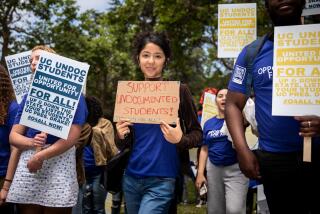Napolitano commits funds to aid UC students who entered U.S. illegally
UC President Janet Napolitano, tackling one of the hot button issues facing her new leadership, announced Wednesday that she will authorize $5 million in university funds to help students who entered the country illegally and do not qualify for federal financial aid.
In her first major address since taking office, she also said she will boost support for graduate and postdoctoral researchers by $10 million.
Napolitano has encountered some protests in her first month on the job because of what critics contend was the increase in deportations that she oversaw as U.S. Secretary of Homeland Security.
However, Napolitano long has said that she supports comprehensive immigration reform and implemented the Obama administration’s policy changes that now allow many of those students who were brought to America as children — known as “Dreamers” — to stay in the country for at least several years.
“They are students who deserve the opportunity to succeed and to thrive at UC,” Napolitano said, according to an advance text of a speech she delivered to the Commonwealth Club at the Mark Hopkins Hotel in San Francisco on Wednesday evening.
“I am setting aside $5 million — right now, for this year — to support these students with resources like trained advisors, student service centers and financial aid. Consider this a down payment — one more piece of evidence of our commitment to all Californians,” she said. “UC will continue to be a vehicle for social mobility. We teach for California; we research for the world.”
The funds will not come directly from tuition or state revenues, her staff said. The $5 million for the “Dreamers” and $10 million for graduate student and postdoctoral aid will tap extra reserves in discretionary accounts such as those that help faculty with home mortgages and have benefited from low interest rates.
Because of legislation signed by Gov. Jerry Brown two years ago, students at California’s public colleges and universities who entered the country illegally can receive state and campus-based financial aid. However, they remain ineligible for federal loans and grants.
The $5 million will help “bridge the gap,” according to UC spokeswoman Dianne Klein, who added that details remain to be worked out about how much would be allocated to aid and how much each student could receive. About 900 of UC’s 230,000 students are thought to be “Dreamers,” she said.
Klein insisted that Napolitano, who was Arizona governor before joining the Obama Cabinet, was not taking these steps because of the recent protests but that she came to UC with a priority to help those students.
Kareem Aref, president of the systemwide UC Student Assn., said Napolitano’s announcement was a “great step in the right direction.” The new UC president has been reaching out to students during recent campus tours, he said, but some students remain worried about her because of federal Homeland Security policies.
Her move Wednesday may help ease those fears, said Aref, who is a UC Riverside student.
Some graduate and postdoctoral students, especially those with families and living in high-cost areas of the state, have complained that financial aid is not sufficient. The union representing graduate students working as teaching assistants is negotiating with UC for a new contract and is scheduled to vote soon on whether to authorize a strike. Faculty have expressed worries that UC might lose talented young scholars to other universities.
Napolitano addressed some of those concerns Wednesday in increasing the postdoctoral fellowship programs by $5 million and adding $5 million more to recruit “the world’s best graduate students to our campuses.”
“Graduate students and post-docs are the essential links between teaching for California and researching for the world. They are our future faculty members. They are our future innovators. They are our future Nobel laureates,” she said, according to the text.
Nicole Robinson, who is president of UCLA’s Graduate Student Assn., said that the extra money would help and that she hoped for more. “If it is a start, it is a very good start. If it is the only drop in the bucket, it clearly isn’t going to go very far for very long,” said Robinson, who is a doctoral student in Italian literature.
Without offering details, Napolitano also said that she would propose “some big ideas” at the regents meeting next month to help the 10-campus UC system maintain access for students and research excellence.
In her speech before 500 people, Napolitano conceded that she was a “non-traditional choice” to head UC. But she cited her efforts as Arizona governor to improve education there, her experience in running large government agencies and her family connections to academia, including her father’s position as medical school dean at the University of New Mexico.
She said she was working hard to review UC’s budget. “Our obligation, as public servants, is to stay constantly on the prowl for possible savings. The search for efficiencies is the administrative equivalent of painting the Golden Gate Bridge. The work never ends,” she said.
More to Read
Sign up for Essential California
The most important California stories and recommendations in your inbox every morning.
You may occasionally receive promotional content from the Los Angeles Times.











